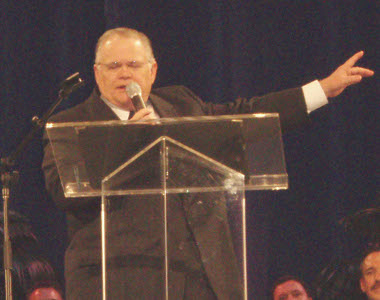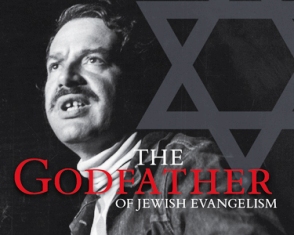Pope Hopes for Peaceful 2013, Slams Unbridled Capitalism
Pope Benedict said in his New Year’s message on Tuesday he hoped 2013 would be a year of peace and … Read More
Pope Benedict said in his New Year’s message on Tuesday he hoped 2013 would be a year of peace and … Read More
In an age where the government—both national and local—has seemingly neglected God’s Word, Apostle Joshua Fowler believes Dec. 12, 2012, … Read More
The Church of England’s governing body on Tuesday narrowly blocked a move to permit women to serve as bishops, leaving … Read More
With Mary, his wife of 62 years by his side, and family members quietly singing “Because He Lives,” Whitaker Corporation … Read More
The uproar over who will serve as New Destiny Christian Center’s next pastor is getting a little louder this week … Read More
Despite days of adverse weather, Christ for All Nations counted 148,330 registered decisions for Jesus and saw mighty miracles of … Read More
Opponents of Senate Bill 48 have worked quickly and vigorously to create a referendum that will temporarily halt the controversial Fair, Accountable, Inclusive and Respectful Education Act (FAIR Act).
The FAIR Act, written by self-admitted homosexual state Sen. Mark Leno of San Francisco, will force all California schools to use textbooks and instructional materials that include homosexual, bisexual and transgender teachings.
The bill passed the Assembly Education committee on June 22, and on July 5 the state Assembly sent it through to Gov. Jerry Brown on a 49-25 vote. Brown signed the bill on July 14, making California the first U.S. state required to teach students about the contributions of homosexuals, bisexuals and transgenders.
California Gov. Jerry Brown signed Senate Bill 48 on Thursday, making California the first U.S. state required to teach students about the contributions of homosexuals, bisexuals and transgenders.
Also known as the Fair, Accountable, Inclusive and Respectful Education Act (FAIR Act), SB 48 was written by self-admitted homosexual state Sen. Mark Leno of San Francisco. The bill passed the Assembly Education committee on June 22, and on July 5 the state Assembly sent it through to Gov. Jerry Brown on a 49-25 vote.
“History should be honest,” Brown said in a statement. “This bill revises existing laws that prohibit discrimination in education and ensures that the important contributions of Americans from all backgrounds and walks of life are included in our history books. It represents an important step forward for our state, and I thank Senator Leno for his hard work on this historic legislation.”
Three in 10 Americans interpret the Bible literally, saying it is the actual Word of God. That is similar to what Gallup has measured over the last two decades, but down from the 1970s and 1980s.
A 49 percent plurality of Americans say the Bible is the inspired word of God but that it should not be taken literally, consistently the most common view in Gallup’s nearly 40-year history of this question. Another 17 percent consider the Bible an ancient book of stories recorded by man.
These results are based on a May 5-8 Gallup poll. The high point in the percentage of Americans favoring a literal interpretation of the Bible was 40 percent, recorded in 1980 and 1984. The low point was 27 percent in 2001.
While most sports fans recognize Mark Clayton as a wide receiver for the St. Louis Rams, another community recognizes Clayton … Read More
The public relations battle over building a mosque at Ground Zero is cranking up even as a New York Supreme … Read More
Find out how to recognize and defeat the seven demons that attack the church. We have explored many of the … Read More
 More than 1,500 churches from a variety of denominations showed their solidarity with Israel during a special service Sunday.
More than 1,500 churches from a variety of denominations showed their solidarity with Israel during a special service Sunday.
On the second annual Christians United for Israel (CUFI) Sunday, congregations prayed for the peace of Jerusalem and pastors dedicated their sermons to explaining why Christians should support the Jewish nation. Organized by Texas pastor John Hagee, founder of CUFI, the event drew participants from all 50 states and 50 nations.
 Moishe Rosen spends a lot of time resting now as he copes with the effects of prostate disease that metastasized into bone cancer. Last fall, he nearly died after surgery for an intestinal blockage.
Moishe Rosen spends a lot of time resting now as he copes with the effects of prostate disease that metastasized into bone cancer. Last fall, he nearly died after surgery for an intestinal blockage.
Although outlasting the doctor’s prediction in January 2008 that he wouldn’t live past Thanksgiving, soon after that surgery Rosen considered hospice care. Ultimately, he rejected it, reasoning he didn’t want it until he was unable to get out of bed.
A last-minute settlement last week cleared the way for a 77-foot cross to be constructed along Interstate 10 in south … Read More
Your personal Bible may have a black, brown, blue, or red leather or imitation leather cover. The words may be a fine-print, red-letter edition distinguishing Christ’s words. Your translation may be the popular 1611 King James Version, New King James Version, Amplified, or New American Standard. It may have a red ribbon inserted to mark selective passages. Your Bible might be a translation from a language other than English. In the Jewish synagogue, the Torah is in the form of a scroll and not a leather-bound book.
{flv width=”280″ height=”220″}ValerieLowe-StandingWithIsraelIntro{/flv} My name is Valerie G. Lowe and I’m the editor of the new Standing with Israel e-newsletter. … Read More
Paul Cain stirred controversy last week when he made comments before thousands of worshippers in Lakeland, Fla., that seemed to … Read More
In June 1939, the United States turned away a ship carrying 937 Jewish refugees from Europe. Most of the passengers later perished in the Holocaust. Yet today, Christians are calling the church to repent for its silence 62 years ago.